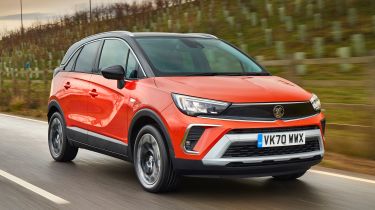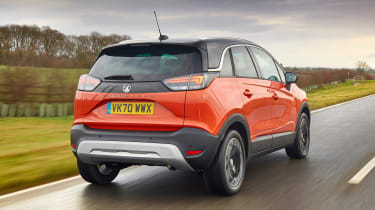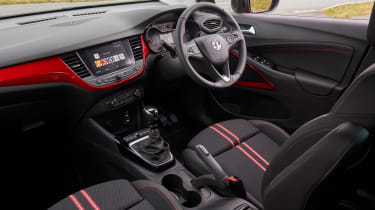Vauxhall Crossland SRi Nav 2021 review
Can the newly updated Vauxhall Crossland finally challenge the best of the small SUV segment?
Verdict
This is a worthy update to the Vauxhall Crossland. While nothing will change the fact that the all-new Mokka is a more desirable small SUV, the Crossland isn’t without purpose. It’s still a reasonably priced small SUV with heaps of space inside and now with sportier appeal, thanks to its new look. Monthly finance isn’t fully on the Vauxhall's side, though; the similar Citroen C3 Aircross works out cheaper per month in similarly high spec trims.
While there are lots of changes going on behind the scenes, the arrival of the facelifted Vauxhall Crossland shows that the British firm is pressing on with launching a range of bold new cars. The updated Crossland (which has now dropped the ‘X’ suffix) is the first of a number of new models to arrive on UK roads that sport the new ‘Vauxhall shield’ face.
The Crossland remains an MPV-inspired small SUV, much like the Citroen C3 Aircross with which it shares a platform, engines and technology. However, while Vauxhall is a brand that is moving forward fast with electrification, the Crossland sticks with the basics, with a line-up of three petrol and two diesel engines on offer.
As far as facelifts go, the Crossland's is an extensive one, and there’s no confusing old and new. The old car's grille makes way for the flush new ‘visor’, with a larger, more rugged-looking stack of intakes placed lower on the new-look front bumper taking care of air flow.
Used - available now

2023 Audi
Q4 Sportback e-tron
54,526 milesAutomaticElectric
Cash £23,363
2022 Kia
Niro
18,315 milesAutomaticPetrol1.6L
Cash £17,900
2023 Nissan
Juke
40,858 milesManualPetrol1.0L
Cash £12,287
2022 Volkswagen
T-Roc
36,779 milesAutomaticPetrol1.5L
Cash £18,600Changes at the back are a bit more reserved. New Crossland badging spans across the centre of a tailgate, with a large horizontal black element now beneath the windscreen, and the tail-lights are tinted darker. The rear bumper is a little more rugged in appearance, too. Elsewhere, sporty SRi trim is now offered on the Crossland, which adds new two-tone 17-inch alloy wheels and a racy interior makeover.
Despite the red accents and stripy seats, the interior remains largely as it was before from a quality perspective. That means the top section of the dashboard is made from soft-touch plastics, but the rest of the cabin has hard and scratchy materials.
The controls and buttons are laid out logically and cleanly, however, and while the eight-inch colour touchscreen isn’t one of the clearest, it's easy to use and comes with standard Apple CarPlay and Android Auto integration. Thankfully (and unlike some of the Crossland's sister models) the touchscreen isn't home to the heater controls - if you’re a fan of proper buttons, the Crossland still has you covered.
As well as the new look, Vauxhall has also updated the Crossland with new suspension and steering in a bid to make it feel better to drive, more comfortable and more stable on motorways. The Crossland was never a front-runner from behind the wheel before the changes, and even with the new dampers and updated steering, it’s still not going to trouble a Ford Puma for fun or a Volkswagen T-Cross for comfort. It’s ever so slightly firm at low speed, but more stable and composed on faster roads.
The engine remains a really strong part of the package. The 1.2-litre turbocharged three-cylinder petrol is available with 108bhp, which will likely suffice for most and will be even more economical to run than the 128bhp option driven here, with its decent claims of 48.7mpg. It feels strong and pulls well in second and third gear, and while the gearbox is loose and with a long throw, the ratios are well judged.
Driving around town and on B-roads, you won’t need to venture further than fifth, while sixth is sufficiently long for low-rev motorway cruising. The Crossland is decently refined, too, though at motorway speeds, the wind noise generated by the car's slab shape means it’s not the quietest small SUV out there, and tyre roar remains an issue.
Elsewhere inside, the Crossland is very spacious by small SUV standards, which is one of the Crossland’s biggest selling points, alongside its sub-£20k starting price. Buyers wanting as much space for their money as possible won’t be disappointed. The high roofline means there’s loads of headroom, and overall there’s plenty of space inside for adults to get comfortable. The driving position doesn’t feel particularly elevated though.
The 410-litre boot is big for this class, and it expands to 1,255 litres with the rear seat folded flat. The bench uses a simple 60:40 fold, and can be moved forward by 150mm if more space in the boot is required without sacrificing passenger carrying.
Affordability is likely to be the main factor in the mind of many potential Crossland buyers, though. Opting for the more powerful 128bhp engine means you'll pay £283 a month over 48 months, with 10 per cent down and a 8,000 miles a year cap in the case of this SRi Nav model. The 108bhp engine in the same trim on the same terms is a more respectable £269 a month.
However, over at Citroen, the mechanically identical, similarly practical and comparably specced C3 Aircross Shine Plus with the 108bhp engine will set you back £250 a month under the same terms. Volkswagen Group cars with better residual values make life hard for the Vauxhall, too - you could be in a highly-specced Skoda Kamiq SE L 110 or even a VW T-Cross SE 110 on the same terms for £257.
| Model: |
Vauxhall Crossland SRi Nav 1.2 Turbo 130PS |
| Price: | £23,390 |
| Engine: |
1.2-litre three-cyl petrol turbo |
| Power/torque: |
128bhp/230Nm |
| Transmission: |
Six-speed manual, front-wheel-drive |
| 0-62mph: | 9.5sec |
| Top speed: | 125mph |
| Fuel economy: | 48.7mpg |
| CO2: | 130g/km |
| On sale: | Now |











